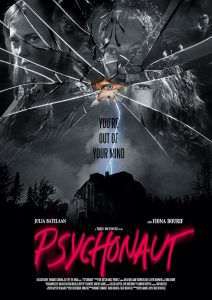
“Psychonaut”
(Netherlands)
Screened at the 43rd Reeling Chicago International LGBTQ+ Film Festival (5/5)
Letterboxd (4.5/5), Imdb.com (9/10), TMDB.com (9/10); Imdb.com critics review
Imagine a film that’s capable of moving the needle forward in multiple genres simultaneously. If you can picture that, then you owe it to yourself to see this imaginative, impressive third feature from writer-director Thijs Meuwese, an offering that effectively advances smart horror and LGBTQ+ cinema at the same time. In this dark futuristic tale, when an accidental shooting leaves Dylan (Yasmin Blake) fighting for her life from a severe head wound, her girlfriend, Maxime (Julia Batelaan), desperately looks for a way to save her. But, rather than take Dylan to a hospital, Maxime drives her to the home of her estranged mother, Samantha (Fiona Dourif), an alternative physician who employs a special diagnostic and treatment device for healing the sick and injured. However, when Dylan is hooked up to the equipment, Maxime and Samantha discover that the outlook is bleak unless they can help Dylan isolate an essential root memory that can be tapped by the device to rewrite the wiring of the injured portions of her brain, a tactic that’s hoped will restore her to full health. Despite the promise of this treatment, though, the question remains, what constitutes that essential memory and how can it be found? That’s the task Maxime undertakes when she electronically links her psyche with Dylan’s in an effort to locate the memory that will enable her recovery. What follows is a surreal psychological odyssey in which Maxime and Dylan explore their minds together to find what they’re looking for. The result is a seamless fusion of past experiences and present forensic investigation, a journey that reveals more than either of them expected, including revelations about themselves and their relationship, Maxime’s longstanding troubled connection with her mother, and how their current circumstances have turned out as they have, much of which has little to do with the catalytic shooting that launched this internal adventure. The filmmaker thus leads viewers on a captivating saga that successfully blends a variety of engaging elements, masterfully edited without missing a beat, including through the unexpected plot twists that pop up along the way. This dazzling journey is further enhanced by its gorgeous cinematography (shot largely in a captivating mix of black, white and red) and an inventively detailed production design, including its quasi-Gothic sets and thoughtfully chosen background elements. And, thankfully, unlike many other contemporary psychological thrillers, the film doesn’t overstay its welcome, skillfully telling its tale with an economic 1:27:00 runtime and no unnecessary filler or padding. What’s most notable, though, is the filmmaker’s ability to present a horror film that goes beyond trite tried-and-true tropes, as well as an LGBTQ+ storyline that pushes the envelope of most typical narratives in this genre, and that it effectively does both in one film. That’s quite an accomplishment, one worthy of high praise. Admittedly, there are a few times when this release verges on being a little too clever for its own good, but those instances are hardly worth mentioning in the wake of everything else it has to offer. “Psychonaut” is a sleeper that truly deserves an audience, especially for fans of films in either of these categories, a release that delivers brilliantly on both fronts.



